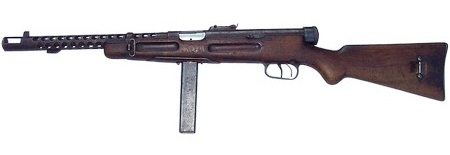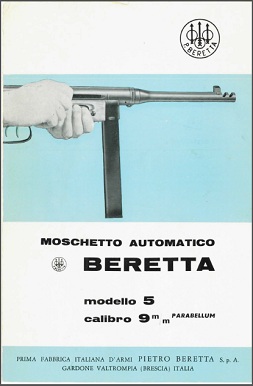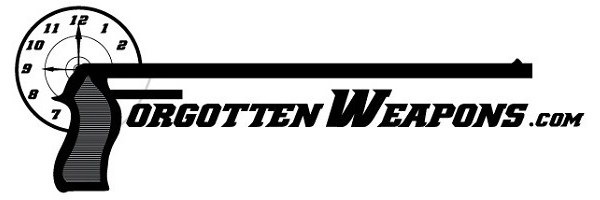The Beretta M1938 submachine gun was designed by Beretta engineer Tulio Marengoni as an improvement on the earlier M1918 design (which was in turn based on the Villar Perosa). Developed during the mid 1930s, the initial variant (M38) was a high quality gun, and very reliable. Despite the tubular appearance, it used a milled receiver and was fairly expensive to manufacture – one of the last of the first generation SMG designs.
Mechanically, the M38 series was typical of submachine guns of its time, and not particularly innovative. However, it was a solid and well-made gun and developed a very good reputation. All variants had dual triggers; the front one for semiauto fire and the rear for full auto. Magazines were made in 10-, 20-, 30-, and 40-round capacity, double-stack and double-feed (meaning rounds alternated between being on the left and right, instead of being forced into a single column at the top of the magazine). All of the M38 family guns were chambered for 9mm Parabellum, and fired at 400-500 rounds per minute.

Somewhat unusual for this type of gun, the M38 has a charging handle on the right side of the receiver and the ejection port on the left side. It fires from an open bolt, and to ready the gun one pulls the charging handle back to bring the bolt back and then push the charging handle forward until it locks in place. This prevents dirt from entering the right side of the action, and the handle does not reciprocate during firing.
Variations
- M1938 – The first variant of the gun was the most complex. It used a small-diameter recoil spring captive inside a guide tube and had a removable firing pin. A small lever in the bolt engaged the front of the receiver to push the firing pin forward, preventing out of battery discharges. The M38 had a long wooden stock and a ventilated barrel shroud with a single large compensator port at the muzzle and a bayonet lug. It was manufactured only in 1938 and 1939.
- M1938A – Shortly after introduction, several small changes were made to the gun, and it was redesignated the M38A available in the US. The most visible change was the use of 4 small slots in the compensator and the removal of the bayonet lug. Both the M38 and 38A retained relatively expensive features like sliding magazine well covers and range-adjustable rear sights.
- M1938/42 – The 38/42 variant of the gun was put into production in 1943 to reduce manufacturing costs. The barrel shroud was removed, the stock cut down to end at the magazine well, the magazine cover removed, rear sight simplified to a fixed notch with a single long-range flip up notch, and the receiver redesigned as a stamping. Two compensator slots were cut in the top of the barrel at the muzzle. This model used a fixed firing pin in place of the safety system of the M38 and M38A. However, it did have a fluted barrel to reduce weight (it weighed 8lb, compared to 9lb 13oz for the M38A).
- M1938/43 – Shortly after introduction, the 38/42 was further simplified by using a smooth barrel instead of a fluted one.
- M1938/44 – The design was again modified to replace the captive small-diameter recoil spring with a larger diameter spring that was held in place simply by nesting around the rear of the bolt (much like a Sten gun).
- M1938/49 – Production continued for military and police contracts after World War II, and in 1949 the lever-type safety was replaced with a cross-bolt one.
- Model 4 – To divert attention from the age of the design, post-war guns made for export were given different model numbers. The Model 4 is actually just an M38/49.
- Model 5 – Identical to the Model 4, but with the addition of a grip safety in the finger grooves of the stock. Production of the Model 4 and 5 continued until 1962, and guns remained in Italian military service into the 1980s.
Manuals


Do you have any idea where 30 round Mags for the 38 Family of Berettas can be purchased. I know they exist because I have 4 that I purchased from Ohio Ordinance years ago. They have no more, but work great and are a nice compromise between the 20 -vs- 40 rounder. My 38/42 needs some more.
Thank you,
John
Sorry, John, but I don’t know of any dealers with 30s in stock. Best I can suggest is to keep an eye on GunBroker.
I have what I think are m1938 30 round mags x 8. Four of them pictured here: http://i.imgur.com/mRKVpT8.jpg?1 let me know if you want them. We can work something out chrisgrier@gmail.com
I have two of them, actually. you won´t believe that… i found those in Colombia (southamerica)
Dear Sir,
Do you know where I could get a nice kit (Beretta Mod. 38/42). Who has nice parts? Thanks.
J.S.Price
Simply by convert UZI mag
Thanks. I’ll have to get one and compare what modification is necessary.
John
I have a rare folding blade bayonet for the Beretta m1938. it is in great condition, it has some bluing left. the wooden handles are pretty good, and it has never been sharpened. Any Idea where I can get an estimate on it’s value?
Looking at completed auctions on GunBroker is a good way to get this sort of info. People are asking big bucks for these bayonets, but the last three that actually sold went for $125, $161, and $299.
Thank you! I will start there.
Thank you Chris. From your picture they are exactly what I am looking for. I will contact you directly . Thank you for your response !
John
I would like to locate a fluted barrel for a 38/42 gun. If you can help, please reply.
I have a fluted barrel for that gun
Are you interested in selling your fluted barrel
Sorry. I can’t help. And the ATFE have made Barrels really hard to get. I lucked out with my 38/42 being a transition piece and still had the 38A barrel and shrowed ( All matching Serial Numbers) and was lucky enough to find 2 spare Barrels in that configuration.
HELLO,
I WOULD LIKE TO ASK IF THE 9mm PARABELUM CARTRIDGES 115 GRAINS AND 124 GRAINS WORKS OK ON THIS ITEM OR ON THE GERMAN MP40 (SMIZER).
WERE THESE CARTRIDGES IN WWII STRONGER THAN THOSE I MENTIONED BEFORE?
DO YOU THINK YOU WILL HAVE BETTER RESULTS IF WE INCREASE THE GRAINS?
THANK YOU
Standard modern 9mm Parabellum with 115 or 124gr bullets should work just fine in either Beretta 38 or MP40 submachine guns.
O.K. GOT IT !!!
DO YOU KNOW IF THE BULLETS THEY USED IN THE BATTLE FIELDS IN THE WWII, WERE A LITTLE MORE STRONGER?
AND IF YES HOW MANY GRAINS DO YOU THINK WERE THEY?
I have one of these smg’S and would like to know what they go for?
According to MachineGunPriceGuides.com, about $11k. Of course, that assume it’s registered, transferable, and in the US.
will a 40 round magazine from a 38A or 38/44 fit a 38/42?
Yes, it will.
Will a coking handle for a 38A beretta fit a 38/42?
should be cocking handle…sorry
I have a 38-42 beretta which is missing a safety lever….I found a site that has what they call a selector switch…is this the same part??? Do you know where I can get a manual for this gun?
Unfortunately, Donna, the Cocking handle on the M38A is a Machined part and the 38-42 has a stamped , Spring steel type. It is one of the changes to make the 38-42 easier and cheaper to manufacture. Can’t answer your selector switch question. The Safety lever is just that. Selecting the fire of the 38-42 is determined by using one of the 2 triggers for semi or Auto fire. Is your 38-42 a Demil – Wall Hanger or is it operational? I have learned quite a bit about this family of weapons should you be interested.
does anyone know where I can get a cocking handle for the 38-42 beretta?
Does anyone know where I can get a cocking handle for a 38-42 beretta?
Can anyone give me a wild guess as to the value of a Beretta 38-42 ?
Ian:yours an excellent page. My query is about a post WWII rifle which has a magazine grip instead or a pistol grip, that was designed by a US Coast Guard officer. It did well on trials but was not adopted. A very interesting design with a well-designed and characteristic muzzle brake. I would like to know a few details on it, its name and, if you some extra info on the weapon. Thankfully.
Can anyone lead me in the direction of a manual for the Beretta 38/42?
I just acquired a Beretta M 1938A but it’s missing some parts. Is there anyone out there that has parts for sale? Thanks
Looks like I’m in the same boat as a lot of you all. Just got an excellent saw cut kit that is missing the cocking lever. It’s the spring steel version that fits the internal dovetail of the reciever.
Do the M38 magazine fit all models
Hello, I own a baretta m38/42 Woodstock variant. Unfortunately I have lost the back cap for reciever. Is there a ny way I can find a replacement back cap for reciever? Any suggestion or advice would be appreciated.